-
EXECUTIVE SUMMARY
-
Market Overview
-
Key Findings
-
Market Segmentation
-
Competitive Landscape
-
Challenges and Opportunities
-
Future Outlook
-
MARKET INTRODUCTION
-
Definition
-
Scope of the study
- Research Objective
- Assumption
- Limitations
-
RESEARCH METHODOLOGY
-
Overview
-
Data Mining
-
Secondary Research
-
Primary Research
- Primary Interviews and Information Gathering Process
- Breakdown of Primary Respondents
-
Forecasting Model
-
Market Size Estimation
- Bottom-Up Approach
- Top-Down Approach
-
Data Triangulation
-
Validation
-
MARKET DYNAMICS
-
Overview
-
Drivers
-
Restraints
-
Opportunities
-
MARKET FACTOR ANALYSIS
-
Value chain Analysis
-
Porter''s Five Forces Analysis
- Bargaining Power of Suppliers
- Bargaining Power of Buyers
- Threat of New Entrants
- Threat of Substitutes
- Intensity of Rivalry
-
COVID-19 Impact Analysis
- Market Impact Analysis
- Regional Impact
- Opportunity and Threat Analysis
-
SMOOTHIES MARKET, BY PRODUCT TYPE (USD BILLION)
-
Fruit Smoothies
-
Vegetable Smoothies
-
Protein Smoothies
-
Nut-Based Smoothies
-
SMOOTHIES MARKET, BY DISTRIBUTION CHANNEL (USD BILLION)
-
Supermarkets
-
Online Retail
-
Health and Wellness Stores
-
Convenience Stores
-
SMOOTHIES MARKET, BY INGREDIENTS (USD BILLION)
-
Organic Ingredients
-
Conventional Ingredients
-
Added Supplements
-
Non-Dairy Alternatives
-
SMOOTHIES MARKET, BY END USE (USD BILLION)
-
Household
-
Commercial
-
SMOOTHIES MARKET, BY REGIONAL (USD BILLION)
-
North America
- US
- Canada
-
Europe
- Germany
- UK
- France
- Russia
- Italy
- Spain
- Rest of Europe
-
APAC
- China
- India
- Japan
- South Korea
- Malaysia
- Thailand
- Indonesia
- Rest of APAC
-
South America
- Brazil
- Mexico
- Argentina
- Rest of South America
-
MEA
- GCC Countries
- South Africa
- Rest of MEA
-
COMPETITIVE LANDSCAPE
-
Overview
-
Competitive Analysis
-
Market share Analysis
-
Major Growth Strategy in the Smoothies Market
-
Competitive Benchmarking
-
Leading Players in Terms of Number of Developments in the Smoothies Market
-
Key developments and growth strategies
- New Product Launch/Service Deployment
- Merger & Acquisitions
- Joint Ventures
-
Major Players Financial Matrix
- Sales and Operating Income
- Major Players R&D Expenditure. 2023
-
COMPANY PROFILES
-
Smoothie King
- Financial Overview
- Products Offered
- Key Developments
- SWOT Analysis
- Key Strategies
-
Odwalla
- Financial Overview
- Products Offered
- Key Developments
- SWOT Analysis
- Key Strategies
-
Danone
- Financial Overview
- Products Offered
- Key Developments
- SWOT Analysis
- Key Strategies
-
Bolthouse Farms
- Financial Overview
- Products Offered
- Key Developments
- SWOT Analysis
- Key Strategies
-
Naked Juice
- Financial Overview
- Products Offered
- Key Developments
- SWOT Analysis
- Key Strategies
-
Garden of Life
- Financial Overview
- Products Offered
- Key Developments
- SWOT Analysis
- Key Strategies
-
Dole Food Company
- Financial Overview
- Products Offered
- Key Developments
- SWOT Analysis
- Key Strategies
-
V8
- Financial Overview
- Products Offered
- Key Developments
- SWOT Analysis
- Key Strategies
-
Unilever
- Financial Overview
- Products Offered
- Key Developments
- SWOT Analysis
- Key Strategies
-
Suja Juice
- Financial Overview
- Products Offered
- Key Developments
- SWOT Analysis
- Key Strategies
-
Nestle
- Financial Overview
- Products Offered
- Key Developments
- SWOT Analysis
- Key Strategies
-
PepsiCo
- Financial Overview
- Products Offered
- Key Developments
- SWOT Analysis
- Key Strategies
-
CocaCola
- Financial Overview
- Products Offered
- Key Developments
- SWOT Analysis
- Key Strategies
-
Tropicana Products
- Financial Overview
- Products Offered
- Key Developments
- SWOT Analysis
- Key Strategies
-
Califia Farms
- Financial Overview
- Products Offered
- Key Developments
- SWOT Analysis
- Key Strategies
-
APPENDIX
-
References
-
Related Reports
-
LIST OF TABLES
-
LIST OF ASSUMPTIONS
-
NORTH AMERICA SMOOTHIES MARKET SIZE ESTIMATES & FORECAST, BY PRODUCT TYPE, 2019-2035 (USD BILLIONS)
-
NORTH AMERICA SMOOTHIES MARKET SIZE ESTIMATES & FORECAST, BY DISTRIBUTION CHANNEL, 2019-2035 (USD BILLIONS)
-
NORTH AMERICA SMOOTHIES MARKET SIZE ESTIMATES & FORECAST, BY INGREDIENTS, 2019-2035 (USD BILLIONS)
-
NORTH AMERICA SMOOTHIES MARKET SIZE ESTIMATES & FORECAST, BY END USE, 2019-2035 (USD BILLIONS)
-
NORTH AMERICA SMOOTHIES MARKET SIZE ESTIMATES & FORECAST, BY REGIONAL, 2019-2035 (USD BILLIONS)
-
US SMOOTHIES MARKET SIZE ESTIMATES & FORECAST, BY PRODUCT TYPE, 2019-2035 (USD BILLIONS)
-
US SMOOTHIES MARKET SIZE ESTIMATES & FORECAST, BY DISTRIBUTION CHANNEL, 2019-2035 (USD BILLIONS)
-
US SMOOTHIES MARKET SIZE ESTIMATES & FORECAST, BY INGREDIENTS, 2019-2035 (USD BILLIONS)
-
US SMOOTHIES MARKET SIZE ESTIMATES & FORECAST, BY END USE, 2019-2035 (USD BILLIONS)
-
US SMOOTHIES MARKET SIZE ESTIMATES & FORECAST, BY REGIONAL, 2019-2035 (USD BILLIONS)
-
CANADA SMOOTHIES MARKET SIZE ESTIMATES & FORECAST, BY PRODUCT TYPE, 2019-2035 (USD BILLIONS)
-
CANADA SMOOTHIES MARKET SIZE ESTIMATES & FORECAST, BY DISTRIBUTION CHANNEL, 2019-2035 (USD BILLIONS)
-
CANADA SMOOTHIES MARKET SIZE ESTIMATES & FORECAST, BY INGREDIENTS, 2019-2035 (USD BILLIONS)
-
CANADA SMOOTHIES MARKET SIZE ESTIMATES & FORECAST, BY END USE, 2019-2035 (USD BILLIONS)
-
CANADA SMOOTHIES MARKET SIZE ESTIMATES & FORECAST, BY REGIONAL, 2019-2035 (USD BILLIONS)
-
EUROPE SMOOTHIES MARKET SIZE ESTIMATES & FORECAST, BY PRODUCT TYPE, 2019-2035 (USD BILLIONS)
-
EUROPE SMOOTHIES MARKET SIZE ESTIMATES & FORECAST, BY DISTRIBUTION CHANNEL, 2019-2035 (USD BILLIONS)
-
EUROPE SMOOTHIES MARKET SIZE ESTIMATES & FORECAST, BY INGREDIENTS, 2019-2035 (USD BILLIONS)
-
EUROPE SMOOTHIES MARKET SIZE ESTIMATES & FORECAST, BY END USE, 2019-2035 (USD BILLIONS)
-
EUROPE SMOOTHIES MARKET SIZE ESTIMATES & FORECAST, BY REGIONAL, 2019-2035 (USD BILLIONS)
-
GERMANY SMOOTHIES MARKET SIZE ESTIMATES & FORECAST, BY PRODUCT TYPE, 2019-2035 (USD BILLIONS)
-
GERMANY SMOOTHIES MARKET SIZE ESTIMATES & FORECAST, BY DISTRIBUTION CHANNEL, 2019-2035 (USD BILLIONS)
-
GERMANY SMOOTHIES MARKET SIZE ESTIMATES & FORECAST, BY INGREDIENTS, 2019-2035 (USD BILLIONS)
-
GERMANY SMOOTHIES MARKET SIZE ESTIMATES & FORECAST, BY END USE, 2019-2035 (USD BILLIONS)
-
GERMANY SMOOTHIES MARKET SIZE ESTIMATES & FORECAST, BY REGIONAL, 2019-2035 (USD BILLIONS)
-
UK SMOOTHIES MARKET SIZE ESTIMATES & FORECAST, BY PRODUCT TYPE, 2019-2035 (USD BILLIONS)
-
UK SMOOTHIES MARKET SIZE ESTIMATES & FORECAST, BY DISTRIBUTION CHANNEL, 2019-2035 (USD BILLIONS)
-
UK SMOOTHIES MARKET SIZE ESTIMATES & FORECAST, BY INGREDIENTS, 2019-2035 (USD BILLIONS)
-
UK SMOOTHIES MARKET SIZE ESTIMATES & FORECAST, BY END USE, 2019-2035 (USD BILLIONS)
-
UK SMOOTHIES MARKET SIZE ESTIMATES & FORECAST, BY REGIONAL, 2019-2035 (USD BILLIONS)
-
FRANCE SMOOTHIES MARKET SIZE ESTIMATES & FORECAST, BY PRODUCT TYPE, 2019-2035 (USD BILLIONS)
-
FRANCE SMOOTHIES MARKET SIZE ESTIMATES & FORECAST, BY DISTRIBUTION CHANNEL, 2019-2035 (USD BILLIONS)
-
FRANCE SMOOTHIES MARKET SIZE ESTIMATES & FORECAST, BY INGREDIENTS, 2019-2035 (USD BILLIONS)
-
FRANCE SMOOTHIES MARKET SIZE ESTIMATES & FORECAST, BY END USE, 2019-2035 (USD BILLIONS)
-
FRANCE SMOOTHIES MARKET SIZE ESTIMATES & FORECAST, BY REGIONAL, 2019-2035 (USD BILLIONS)
-
RUSSIA SMOOTHIES MARKET SIZE ESTIMATES & FORECAST, BY PRODUCT TYPE, 2019-2035 (USD BILLIONS)
-
RUSSIA SMOOTHIES MARKET SIZE ESTIMATES & FORECAST, BY DISTRIBUTION CHANNEL, 2019-2035 (USD BILLIONS)
-
RUSSIA SMOOTHIES MARKET SIZE ESTIMATES & FORECAST, BY INGREDIENTS, 2019-2035 (USD BILLIONS)
-
RUSSIA SMOOTHIES MARKET SIZE ESTIMATES & FORECAST, BY END USE, 2019-2035 (USD BILLIONS)
-
RUSSIA SMOOTHIES MARKET SIZE ESTIMATES & FORECAST, BY REGIONAL, 2019-2035 (USD BILLIONS)
-
ITALY SMOOTHIES MARKET SIZE ESTIMATES & FORECAST, BY PRODUCT TYPE, 2019-2035 (USD BILLIONS)
-
ITALY SMOOTHIES MARKET SIZE ESTIMATES & FORECAST, BY DISTRIBUTION CHANNEL, 2019-2035 (USD BILLIONS)
-
ITALY SMOOTHIES MARKET SIZE ESTIMATES & FORECAST, BY INGREDIENTS, 2019-2035 (USD BILLIONS)
-
ITALY SMOOTHIES MARKET SIZE ESTIMATES & FORECAST, BY END USE, 2019-2035 (USD BILLIONS)
-
ITALY SMOOTHIES MARKET SIZE ESTIMATES & FORECAST, BY REGIONAL, 2019-2035 (USD BILLIONS)
-
SPAIN SMOOTHIES MARKET SIZE ESTIMATES & FORECAST, BY PRODUCT TYPE, 2019-2035 (USD BILLIONS)
-
SPAIN SMOOTHIES MARKET SIZE ESTIMATES & FORECAST, BY DISTRIBUTION CHANNEL, 2019-2035 (USD BILLIONS)
-
SPAIN SMOOTHIES MARKET SIZE ESTIMATES & FORECAST, BY INGREDIENTS, 2019-2035 (USD BILLIONS)
-
SPAIN SMOOTHIES MARKET SIZE ESTIMATES & FORECAST, BY END USE, 2019-2035 (USD BILLIONS)
-
SPAIN SMOOTHIES MARKET SIZE ESTIMATES & FORECAST, BY REGIONAL, 2019-2035 (USD BILLIONS)
-
REST OF EUROPE SMOOTHIES MARKET SIZE ESTIMATES & FORECAST, BY PRODUCT TYPE, 2019-2035 (USD BILLIONS)
-
REST OF EUROPE SMOOTHIES MARKET SIZE ESTIMATES & FORECAST, BY DISTRIBUTION CHANNEL, 2019-2035 (USD BILLIONS)
-
REST OF EUROPE SMOOTHIES MARKET SIZE ESTIMATES & FORECAST, BY INGREDIENTS, 2019-2035 (USD BILLIONS)
-
REST OF EUROPE SMOOTHIES MARKET SIZE ESTIMATES & FORECAST, BY END USE, 2019-2035 (USD BILLIONS)
-
REST OF EUROPE SMOOTHIES MARKET SIZE ESTIMATES & FORECAST, BY REGIONAL, 2019-2035 (USD BILLIONS)
-
APAC SMOOTHIES MARKET SIZE ESTIMATES & FORECAST, BY PRODUCT TYPE, 2019-2035 (USD BILLIONS)
-
APAC SMOOTHIES MARKET SIZE ESTIMATES & FORECAST, BY DISTRIBUTION CHANNEL, 2019-2035 (USD BILLIONS)
-
APAC SMOOTHIES MARKET SIZE ESTIMATES & FORECAST, BY INGREDIENTS, 2019-2035 (USD BILLIONS)
-
APAC SMOOTHIES MARKET SIZE ESTIMATES & FORECAST, BY END USE, 2019-2035 (USD BILLIONS)
-
APAC SMOOTHIES MARKET SIZE ESTIMATES & FORECAST, BY REGIONAL, 2019-2035 (USD BILLIONS)
-
CHINA SMOOTHIES MARKET SIZE ESTIMATES & FORECAST, BY PRODUCT TYPE, 2019-2035 (USD BILLIONS)
-
CHINA SMOOTHIES MARKET SIZE ESTIMATES & FORECAST, BY DISTRIBUTION CHANNEL, 2019-2035 (USD BILLIONS)
-
CHINA SMOOTHIES MARKET SIZE ESTIMATES & FORECAST, BY INGREDIENTS, 2019-2035 (USD BILLIONS)
-
CHINA SMOOTHIES MARKET SIZE ESTIMATES & FORECAST, BY END USE, 2019-2035 (USD BILLIONS)
-
CHINA SMOOTHIES MARKET SIZE ESTIMATES & FORECAST, BY REGIONAL, 2019-2035 (USD BILLIONS)
-
INDIA SMOOTHIES MARKET SIZE ESTIMATES & FORECAST, BY PRODUCT TYPE, 2019-2035 (USD BILLIONS)
-
INDIA SMOOTHIES MARKET SIZE ESTIMATES & FORECAST, BY DISTRIBUTION CHANNEL, 2019-2035 (USD BILLIONS)
-
INDIA SMOOTHIES MARKET SIZE ESTIMATES & FORECAST, BY INGREDIENTS, 2019-2035 (USD BILLIONS)
-
INDIA SMOOTHIES MARKET SIZE ESTIMATES & FORECAST, BY END USE, 2019-2035 (USD BILLIONS)
-
INDIA SMOOTHIES MARKET SIZE ESTIMATES & FORECAST, BY REGIONAL, 2019-2035 (USD BILLIONS)
-
JAPAN SMOOTHIES MARKET SIZE ESTIMATES & FORECAST, BY PRODUCT TYPE, 2019-2035 (USD BILLIONS)
-
JAPAN SMOOTHIES MARKET SIZE ESTIMATES & FORECAST, BY DISTRIBUTION CHANNEL, 2019-2035 (USD BILLIONS)
-
JAPAN SMOOTHIES MARKET SIZE ESTIMATES & FORECAST, BY INGREDIENTS, 2019-2035 (USD BILLIONS)
-
JAPAN SMOOTHIES MARKET SIZE ESTIMATES & FORECAST, BY END USE, 2019-2035 (USD BILLIONS)
-
JAPAN SMOOTHIES MARKET SIZE ESTIMATES & FORECAST, BY REGIONAL, 2019-2035 (USD BILLIONS)
-
SOUTH KOREA SMOOTHIES MARKET SIZE ESTIMATES & FORECAST, BY PRODUCT TYPE, 2019-2035 (USD BILLIONS)
-
SOUTH KOREA SMOOTHIES MARKET SIZE ESTIMATES & FORECAST, BY DISTRIBUTION CHANNEL, 2019-2035 (USD BILLIONS)
-
SOUTH KOREA SMOOTHIES MARKET SIZE ESTIMATES & FORECAST, BY INGREDIENTS, 2019-2035 (USD BILLIONS)
-
SOUTH KOREA SMOOTHIES MARKET SIZE ESTIMATES & FORECAST, BY END USE, 2019-2035 (USD BILLIONS)
-
SOUTH KOREA SMOOTHIES MARKET SIZE ESTIMATES & FORECAST, BY REGIONAL, 2019-2035 (USD BILLIONS)
-
MALAYSIA SMOOTHIES MARKET SIZE ESTIMATES & FORECAST, BY PRODUCT TYPE, 2019-2035 (USD BILLIONS)
-
MALAYSIA SMOOTHIES MARKET SIZE ESTIMATES & FORECAST, BY DISTRIBUTION CHANNEL, 2019-2035 (USD BILLIONS)
-
MALAYSIA SMOOTHIES MARKET SIZE ESTIMATES & FORECAST, BY INGREDIENTS, 2019-2035 (USD BILLIONS)
-
MALAYSIA SMOOTHIES MARKET SIZE ESTIMATES & FORECAST, BY END USE, 2019-2035 (USD BILLIONS)
-
MALAYSIA SMOOTHIES MARKET SIZE ESTIMATES & FORECAST, BY REGIONAL, 2019-2035 (USD BILLIONS)
-
THAILAND SMOOTHIES MARKET SIZE ESTIMATES & FORECAST, BY PRODUCT TYPE, 2019-2035 (USD BILLIONS)
-
THAILAND SMOOTHIES MARKET SIZE ESTIMATES & FORECAST, BY DISTRIBUTION CHANNEL, 2019-2035 (USD BILLIONS)
-
THAILAND SMOOTHIES MARKET SIZE ESTIMATES & FORECAST, BY INGREDIENTS, 2019-2035 (USD BILLIONS)
-
THAILAND SMOOTHIES MARKET SIZE ESTIMATES & FORECAST, BY END USE, 2019-2035 (USD BILLIONS)
-
THAILAND SMOOTHIES MARKET SIZE ESTIMATES & FORECAST, BY REGIONAL, 2019-2035 (USD BILLIONS)
-
INDONESIA SMOOTHIES MARKET SIZE ESTIMATES & FORECAST, BY PRODUCT TYPE, 2019-2035 (USD BILLIONS)
-
INDONESIA SMOOTHIES MARKET SIZE ESTIMATES & FORECAST, BY DISTRIBUTION CHANNEL, 2019-2035 (USD BILLIONS)
-
INDONESIA SMOOTHIES MARKET SIZE ESTIMATES & FORECAST, BY INGREDIENTS, 2019-2035 (USD BILLIONS)
-
INDONESIA SMOOTHIES MARKET SIZE ESTIMATES & FORECAST, BY END USE, 2019-2035 (USD BILLIONS)
-
INDONESIA SMOOTHIES MARKET SIZE ESTIMATES & FORECAST, BY REGIONAL, 2019-2035 (USD BILLIONS)
-
REST OF APAC SMOOTHIES MARKET SIZE ESTIMATES & FORECAST, BY PRODUCT TYPE, 2019-2035 (USD BILLIONS)
-
REST OF APAC SMOOTHIES MARKET SIZE ESTIMATES & FORECAST, BY DISTRIBUTION CHANNEL, 2019-2035 (USD BILLIONS)
-
REST OF APAC SMOOTHIES MARKET SIZE ESTIMATES & FORECAST, BY INGREDIENTS, 2019-2035 (USD BILLIONS)
-
REST OF APAC SMOOTHIES MARKET SIZE ESTIMATES & FORECAST, BY END USE, 2019-2035 (USD BILLIONS)
-
REST OF APAC SMOOTHIES MARKET SIZE ESTIMATES & FORECAST, BY REGIONAL, 2019-2035 (USD BILLIONS)
-
SOUTH AMERICA SMOOTHIES MARKET SIZE ESTIMATES & FORECAST, BY PRODUCT TYPE, 2019-2035 (USD BILLIONS)
-
SOUTH AMERICA SMOOTHIES MARKET SIZE ESTIMATES & FORECAST, BY DISTRIBUTION CHANNEL, 2019-2035 (USD BILLIONS)
-
SOUTH AMERICA SMOOTHIES MARKET SIZE ESTIMATES & FORECAST, BY INGREDIENTS, 2019-2035 (USD BILLIONS)
-
SOUTH AMERICA SMOOTHIES MARKET SIZE ESTIMATES & FORECAST, BY END USE, 2019-2035 (USD BILLIONS)
-
SOUTH AMERICA SMOOTHIES MARKET SIZE ESTIMATES & FORECAST, BY REGIONAL, 2019-2035 (USD BILLIONS)
-
BRAZIL SMOOTHIES MARKET SIZE ESTIMATES & FORECAST, BY PRODUCT TYPE, 2019-2035 (USD BILLIONS)
-
BRAZIL SMOOTHIES MARKET SIZE ESTIMATES & FORECAST, BY DISTRIBUTION CHANNEL, 2019-2035 (USD BILLIONS)
-
BRAZIL SMOOTHIES MARKET SIZE ESTIMATES & FORECAST, BY INGREDIENTS, 2019-2035 (USD BILLIONS)
-
BRAZIL SMOOTHIES MARKET SIZE ESTIMATES & FORECAST, BY END USE, 2019-2035 (USD BILLIONS)
-
BRAZIL SMOOTHIES MARKET SIZE ESTIMATES & FORECAST, BY REGIONAL, 2019-2035 (USD BILLIONS)
-
MEXICO SMOOTHIES MARKET SIZE ESTIMATES & FORECAST, BY PRODUCT TYPE, 2019-2035 (USD BILLIONS)
-
MEXICO SMOOTHIES MARKET SIZE ESTIMATES & FORECAST, BY DISTRIBUTION CHANNEL, 2019-2035 (USD BILLIONS)
-
MEXICO SMOOTHIES MARKET SIZE ESTIMATES & FORECAST, BY INGREDIENTS, 2019-2035 (USD BILLIONS)
-
MEXICO SMOOTHIES MARKET SIZE ESTIMATES & FORECAST, BY END USE, 2019-2035 (USD BILLIONS)
-
MEXICO SMOOTHIES MARKET SIZE ESTIMATES & FORECAST, BY REGIONAL, 2019-2035 (USD BILLIONS)
-
ARGENTINA SMOOTHIES MARKET SIZE ESTIMATES & FORECAST, BY PRODUCT TYPE, 2019-2035 (USD BILLIONS)
-
ARGENTINA SMOOTHIES MARKET SIZE ESTIMATES & FORECAST, BY DISTRIBUTION CHANNEL, 2019-2035 (USD BILLIONS)
-
ARGENTINA SMOOTHIES MARKET SIZE ESTIMATES & FORECAST, BY INGREDIENTS, 2019-2035 (USD BILLIONS)
-
ARGENTINA SMOOTHIES MARKET SIZE ESTIMATES & FORECAST, BY END USE, 2019-2035 (USD BILLIONS)
-
ARGENTINA SMOOTHIES MARKET SIZE ESTIMATES & FORECAST, BY REGIONAL, 2019-2035 (USD BILLIONS)
-
REST OF SOUTH AMERICA SMOOTHIES MARKET SIZE ESTIMATES & FORECAST, BY PRODUCT TYPE, 2019-2035 (USD BILLIONS)
-
REST OF SOUTH AMERICA SMOOTHIES MARKET SIZE ESTIMATES & FORECAST, BY DISTRIBUTION CHANNEL, 2019-2035 (USD BILLIONS)
-
REST OF SOUTH AMERICA SMOOTHIES MARKET SIZE ESTIMATES & FORECAST, BY INGREDIENTS, 2019-2035 (USD BILLIONS)
-
REST OF SOUTH AMERICA SMOOTHIES MARKET SIZE ESTIMATES & FORECAST, BY END USE, 2019-2035 (USD BILLIONS)
-
REST OF SOUTH AMERICA SMOOTHIES MARKET SIZE ESTIMATES & FORECAST, BY REGIONAL, 2019-2035 (USD BILLIONS)
-
MEA SMOOTHIES MARKET SIZE ESTIMATES & FORECAST, BY PRODUCT TYPE, 2019-2035 (USD BILLIONS)
-
MEA SMOOTHIES MARKET SIZE ESTIMATES & FORECAST, BY DISTRIBUTION CHANNEL, 2019-2035 (USD BILLIONS)
-
MEA SMOOTHIES MARKET SIZE ESTIMATES & FORECAST, BY INGREDIENTS, 2019-2035 (USD BILLIONS)
-
MEA SMOOTHIES MARKET SIZE ESTIMATES & FORECAST, BY END USE, 2019-2035 (USD BILLIONS)
-
MEA SMOOTHIES MARKET SIZE ESTIMATES & FORECAST, BY REGIONAL, 2019-2035 (USD BILLIONS)
-
GCC COUNTRIES SMOOTHIES MARKET SIZE ESTIMATES & FORECAST, BY PRODUCT TYPE, 2019-2035 (USD BILLIONS)
-
GCC COUNTRIES SMOOTHIES MARKET SIZE ESTIMATES & FORECAST, BY DISTRIBUTION CHANNEL, 2019-2035 (USD BILLIONS)
-
GCC COUNTRIES SMOOTHIES MARKET SIZE ESTIMATES & FORECAST, BY INGREDIENTS, 2019-2035 (USD BILLIONS)
-
GCC COUNTRIES SMOOTHIES MARKET SIZE ESTIMATES & FORECAST, BY END USE, 2019-2035 (USD BILLIONS)
-
GCC COUNTRIES SMOOTHIES MARKET SIZE ESTIMATES & FORECAST, BY REGIONAL, 2019-2035 (USD BILLIONS)
-
SOUTH AFRICA SMOOTHIES MARKET SIZE ESTIMATES & FORECAST, BY PRODUCT TYPE, 2019-2035 (USD BILLIONS)
-
SOUTH AFRICA SMOOTHIES MARKET SIZE ESTIMATES & FORECAST, BY DISTRIBUTION CHANNEL, 2019-2035 (USD BILLIONS)
-
SOUTH AFRICA SMOOTHIES MARKET SIZE ESTIMATES & FORECAST, BY INGREDIENTS, 2019-2035 (USD BILLIONS)
-
SOUTH AFRICA SMOOTHIES MARKET SIZE ESTIMATES & FORECAST, BY END USE, 2019-2035 (USD BILLIONS)
-
SOUTH AFRICA SMOOTHIES MARKET SIZE ESTIMATES & FORECAST, BY REGIONAL, 2019-2035 (USD BILLIONS)
-
REST OF MEA SMOOTHIES MARKET SIZE ESTIMATES & FORECAST, BY PRODUCT TYPE, 2019-2035 (USD BILLIONS)
-
REST OF MEA SMOOTHIES MARKET SIZE ESTIMATES & FORECAST, BY DISTRIBUTION CHANNEL, 2019-2035 (USD BILLIONS)
-
REST OF MEA SMOOTHIES MARKET SIZE ESTIMATES & FORECAST, BY INGREDIENTS, 2019-2035 (USD BILLIONS)
-
REST OF MEA SMOOTHIES MARKET SIZE ESTIMATES & FORECAST, BY END USE, 2019-2035 (USD BILLIONS)
-
REST OF MEA SMOOTHIES MARKET SIZE ESTIMATES & FORECAST, BY REGIONAL, 2019-2035 (USD BILLIONS)
-
PRODUCT LAUNCH/PRODUCT DEVELOPMENT/APPROVAL
-
ACQUISITION/PARTNERSHIP
-
LIST OF FIGURES
-
MARKET SYNOPSIS
-
NORTH AMERICA SMOOTHIES MARKET ANALYSIS
-
US SMOOTHIES MARKET ANALYSIS BY PRODUCT TYPE
-
US SMOOTHIES MARKET ANALYSIS BY DISTRIBUTION CHANNEL
-
US SMOOTHIES MARKET ANALYSIS BY INGREDIENTS
-
US SMOOTHIES MARKET ANALYSIS BY END USE
-
US SMOOTHIES MARKET ANALYSIS BY REGIONAL
-
CANADA SMOOTHIES MARKET ANALYSIS BY PRODUCT TYPE
-
CANADA SMOOTHIES MARKET ANALYSIS BY DISTRIBUTION CHANNEL
-
CANADA SMOOTHIES MARKET ANALYSIS BY INGREDIENTS
-
CANADA SMOOTHIES MARKET ANALYSIS BY END USE
-
CANADA SMOOTHIES MARKET ANALYSIS BY REGIONAL
-
EUROPE SMOOTHIES MARKET ANALYSIS
-
GERMANY SMOOTHIES MARKET ANALYSIS BY PRODUCT TYPE
-
GERMANY SMOOTHIES MARKET ANALYSIS BY DISTRIBUTION CHANNEL
-
GERMANY SMOOTHIES MARKET ANALYSIS BY INGREDIENTS
-
GERMANY SMOOTHIES MARKET ANALYSIS BY END USE
-
GERMANY SMOOTHIES MARKET ANALYSIS BY REGIONAL
-
UK SMOOTHIES MARKET ANALYSIS BY PRODUCT TYPE
-
UK SMOOTHIES MARKET ANALYSIS BY DISTRIBUTION CHANNEL
-
UK SMOOTHIES MARKET ANALYSIS BY INGREDIENTS
-
UK SMOOTHIES MARKET ANALYSIS BY END USE
-
UK SMOOTHIES MARKET ANALYSIS BY REGIONAL
-
FRANCE SMOOTHIES MARKET ANALYSIS BY PRODUCT TYPE
-
FRANCE SMOOTHIES MARKET ANALYSIS BY DISTRIBUTION CHANNEL
-
FRANCE SMOOTHIES MARKET ANALYSIS BY INGREDIENTS
-
FRANCE SMOOTHIES MARKET ANALYSIS BY END USE
-
FRANCE SMOOTHIES MARKET ANALYSIS BY REGIONAL
-
RUSSIA SMOOTHIES MARKET ANALYSIS BY PRODUCT TYPE
-
RUSSIA SMOOTHIES MARKET ANALYSIS BY DISTRIBUTION CHANNEL
-
RUSSIA SMOOTHIES MARKET ANALYSIS BY INGREDIENTS
-
RUSSIA SMOOTHIES MARKET ANALYSIS BY END USE
-
RUSSIA SMOOTHIES MARKET ANALYSIS BY REGIONAL
-
ITALY SMOOTHIES MARKET ANALYSIS BY PRODUCT TYPE
-
ITALY SMOOTHIES MARKET ANALYSIS BY DISTRIBUTION CHANNEL
-
ITALY SMOOTHIES MARKET ANALYSIS BY INGREDIENTS
-
ITALY SMOOTHIES MARKET ANALYSIS BY END USE
-
ITALY SMOOTHIES MARKET ANALYSIS BY REGIONAL
-
SPAIN SMOOTHIES MARKET ANALYSIS BY PRODUCT TYPE
-
SPAIN SMOOTHIES MARKET ANALYSIS BY DISTRIBUTION CHANNEL
-
SPAIN SMOOTHIES MARKET ANALYSIS BY INGREDIENTS
-
SPAIN SMOOTHIES MARKET ANALYSIS BY END USE
-
SPAIN SMOOTHIES MARKET ANALYSIS BY REGIONAL
-
REST OF EUROPE SMOOTHIES MARKET ANALYSIS BY PRODUCT TYPE
-
REST OF EUROPE SMOOTHIES MARKET ANALYSIS BY DISTRIBUTION CHANNEL
-
REST OF EUROPE SMOOTHIES MARKET ANALYSIS BY INGREDIENTS
-
REST OF EUROPE SMOOTHIES MARKET ANALYSIS BY END USE
-
REST OF EUROPE SMOOTHIES MARKET ANALYSIS BY REGIONAL
-
APAC SMOOTHIES MARKET ANALYSIS
-
CHINA SMOOTHIES MARKET ANALYSIS BY PRODUCT TYPE
-
CHINA SMOOTHIES MARKET ANALYSIS BY DISTRIBUTION CHANNEL
-
CHINA SMOOTHIES MARKET ANALYSIS BY INGREDIENTS
-
CHINA SMOOTHIES MARKET ANALYSIS BY END USE
-
CHINA SMOOTHIES MARKET ANALYSIS BY REGIONAL
-
INDIA SMOOTHIES MARKET ANALYSIS BY PRODUCT TYPE
-
INDIA SMOOTHIES MARKET ANALYSIS BY DISTRIBUTION CHANNEL
-
INDIA SMOOTHIES MARKET ANALYSIS BY INGREDIENTS
-
INDIA SMOOTHIES MARKET ANALYSIS BY END USE
-
INDIA SMOOTHIES MARKET ANALYSIS BY REGIONAL
-
JAPAN SMOOTHIES MARKET ANALYSIS BY PRODUCT TYPE
-
JAPAN SMOOTHIES MARKET ANALYSIS BY DISTRIBUTION CHANNEL
-
JAPAN SMOOTHIES MARKET ANALYSIS BY INGREDIENTS
-
JAPAN SMOOTHIES MARKET ANALYSIS BY END USE
-
JAPAN SMOOTHIES MARKET ANALYSIS BY REGIONAL
-
SOUTH KOREA SMOOTHIES MARKET ANALYSIS BY PRODUCT TYPE
-
SOUTH KOREA SMOOTHIES MARKET ANALYSIS BY DISTRIBUTION CHANNEL
-
SOUTH KOREA SMOOTHIES MARKET ANALYSIS BY INGREDIENTS
-
SOUTH KOREA SMOOTHIES MARKET ANALYSIS BY END USE
-
SOUTH KOREA SMOOTHIES MARKET ANALYSIS BY REGIONAL
-
MALAYSIA SMOOTHIES MARKET ANALYSIS BY PRODUCT TYPE
-
MALAYSIA SMOOTHIES MARKET ANALYSIS BY DISTRIBUTION CHANNEL
-
MALAYSIA SMOOTHIES MARKET ANALYSIS BY INGREDIENTS
-
MALAYSIA SMOOTHIES MARKET ANALYSIS BY END USE
-
MALAYSIA SMOOTHIES MARKET ANALYSIS BY REGIONAL
-
THAILAND SMOOTHIES MARKET ANALYSIS BY PRODUCT TYPE
-
THAILAND SMOOTHIES MARKET ANALYSIS BY DISTRIBUTION CHANNEL
-
THAILAND SMOOTHIES MARKET ANALYSIS BY INGREDIENTS
-
THAILAND SMOOTHIES MARKET ANALYSIS BY END USE
-
THAILAND SMOOTHIES MARKET ANALYSIS BY REGIONAL
-
INDONESIA SMOOTHIES MARKET ANALYSIS BY PRODUCT TYPE
-
INDONESIA SMOOTHIES MARKET ANALYSIS BY DISTRIBUTION CHANNEL
-
INDONESIA SMOOTHIES MARKET ANALYSIS BY INGREDIENTS
-
INDONESIA SMOOTHIES MARKET ANALYSIS BY END USE
-
INDONESIA SMOOTHIES MARKET ANALYSIS BY REGIONAL
-
REST OF APAC SMOOTHIES MARKET ANALYSIS BY PRODUCT TYPE
-
REST OF APAC SMOOTHIES MARKET ANALYSIS BY DISTRIBUTION CHANNEL
-
REST OF APAC SMOOTHIES MARKET ANALYSIS BY INGREDIENTS
-
REST OF APAC SMOOTHIES MARKET ANALYSIS BY END USE
-
REST OF APAC SMOOTHIES MARKET ANALYSIS BY REGIONAL
-
SOUTH AMERICA SMOOTHIES MARKET ANALYSIS
-
BRAZIL SMOOTHIES MARKET ANALYSIS BY PRODUCT TYPE
-
BRAZIL SMOOTHIES MARKET ANALYSIS BY DISTRIBUTION CHANNEL
-
BRAZIL SMOOTHIES MARKET ANALYSIS BY INGREDIENTS
-
BRAZIL SMOOTHIES MARKET ANALYSIS BY END USE
-
BRAZIL SMOOTHIES MARKET ANALYSIS BY REGIONAL
-
MEXICO SMOOTHIES MARKET ANALYSIS BY PRODUCT TYPE
-
MEXICO SMOOTHIES MARKET ANALYSIS BY DISTRIBUTION CHANNEL
-
MEXICO SMOOTHIES MARKET ANALYSIS BY INGREDIENTS
-
MEXICO SMOOTHIES MARKET ANALYSIS BY END USE
-
MEXICO SMOOTHIES MARKET ANALYSIS BY REGIONAL
-
ARGENTINA SMOOTHIES MARKET ANALYSIS BY PRODUCT TYPE
-
ARGENTINA SMOOTHIES MARKET ANALYSIS BY DISTRIBUTION CHANNEL
-
ARGENTINA SMOOTHIES MARKET ANALYSIS BY INGREDIENTS
-
ARGENTINA SMOOTHIES MARKET ANALYSIS BY END USE
-
ARGENTINA SMOOTHIES MARKET ANALYSIS BY REGIONAL
-
REST OF SOUTH AMERICA SMOOTHIES MARKET ANALYSIS BY PRODUCT TYPE
-
REST OF SOUTH AMERICA SMOOTHIES MARKET ANALYSIS BY DISTRIBUTION CHANNEL
-
REST OF SOUTH AMERICA SMOOTHIES MARKET ANALYSIS BY INGREDIENTS
-
REST OF SOUTH AMERICA SMOOTHIES MARKET ANALYSIS BY END USE
-
REST OF SOUTH AMERICA SMOOTHIES MARKET ANALYSIS BY REGIONAL
-
MEA SMOOTHIES MARKET ANALYSIS
-
GCC COUNTRIES SMOOTHIES MARKET ANALYSIS BY PRODUCT TYPE
-
GCC COUNTRIES SMOOTHIES MARKET ANALYSIS BY DISTRIBUTION CHANNEL
-
GCC COUNTRIES SMOOTHIES MARKET ANALYSIS BY INGREDIENTS
-
GCC COUNTRIES SMOOTHIES MARKET ANALYSIS BY END USE
-
GCC COUNTRIES SMOOTHIES MARKET ANALYSIS BY REGIONAL
-
SOUTH AFRICA SMOOTHIES MARKET ANALYSIS BY PRODUCT TYPE
-
SOUTH AFRICA SMOOTHIES MARKET ANALYSIS BY DISTRIBUTION CHANNEL
-
SOUTH AFRICA SMOOTHIES MARKET ANALYSIS BY INGREDIENTS
-
SOUTH AFRICA SMOOTHIES MARKET ANALYSIS BY END USE
-
SOUTH AFRICA SMOOTHIES MARKET ANALYSIS BY REGIONAL
-
REST OF MEA SMOOTHIES MARKET ANALYSIS BY PRODUCT TYPE
-
REST OF MEA SMOOTHIES MARKET ANALYSIS BY DISTRIBUTION CHANNEL
-
REST OF MEA SMOOTHIES MARKET ANALYSIS BY INGREDIENTS
-
REST OF MEA SMOOTHIES MARKET ANALYSIS BY END USE
-
REST OF MEA SMOOTHIES MARKET ANALYSIS BY REGIONAL
-
KEY BUYING CRITERIA OF SMOOTHIES MARKET
-
RESEARCH PROCESS OF MRFR
-
DRO ANALYSIS OF SMOOTHIES MARKET
-
DRIVERS IMPACT ANALYSIS: SMOOTHIES MARKET
-
RESTRAINTS IMPACT ANALYSIS: SMOOTHIES MARKET
-
SUPPLY / VALUE CHAIN: SMOOTHIES MARKET
-
SMOOTHIES MARKET, BY PRODUCT TYPE, 2025 (% SHARE)
-
SMOOTHIES MARKET, BY PRODUCT TYPE, 2019 TO 2035 (USD Billions)
-
SMOOTHIES MARKET, BY DISTRIBUTION CHANNEL, 2025 (% SHARE)
-
SMOOTHIES MARKET, BY DISTRIBUTION CHANNEL, 2019 TO 2035 (USD Billions)
-
SMOOTHIES MARKET, BY INGREDIENTS, 2025 (% SHARE)
-
SMOOTHIES MARKET, BY INGREDIENTS, 2019 TO 2035 (USD Billions)
-
SMOOTHIES MARKET, BY END USE, 2025 (% SHARE)
-
SMOOTHIES MARKET, BY END USE, 2019 TO 2035 (USD Billions)
-
SMOOTHIES MARKET, BY REGIONAL, 2025 (% SHARE)
-
SMOOTHIES MARKET, BY REGIONAL, 2019 TO 2035 (USD Billions)
-
BENCHMARKING OF MAJOR COMPETITORS


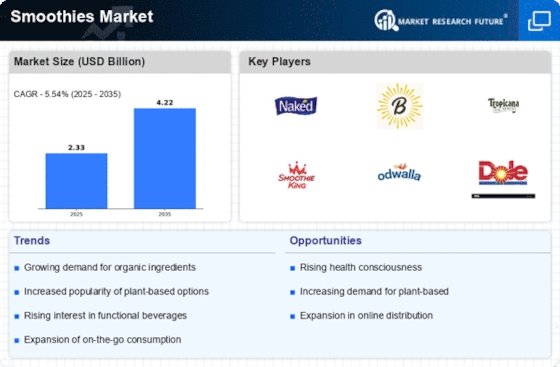

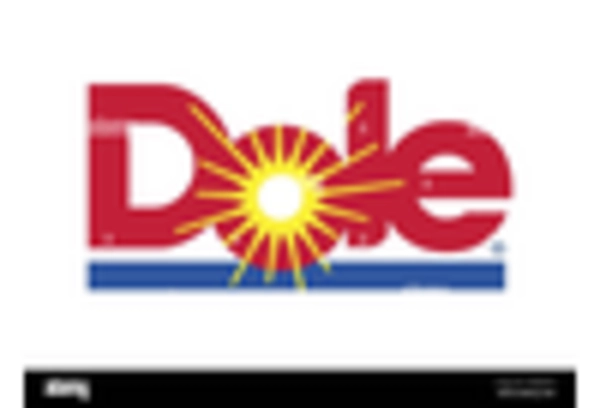
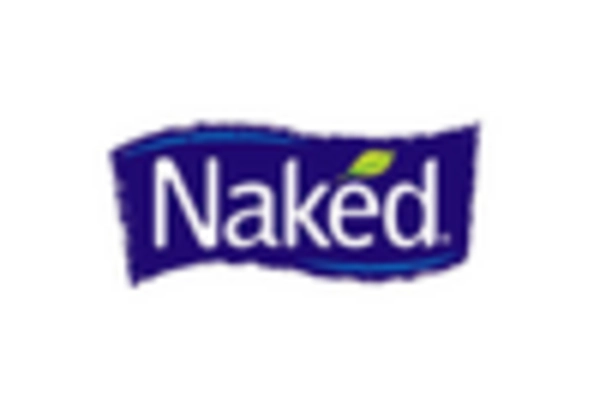
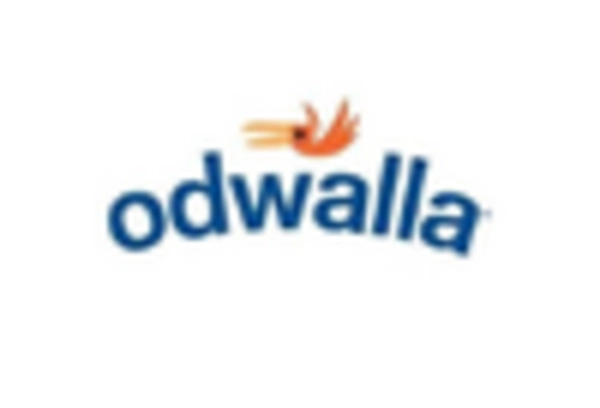
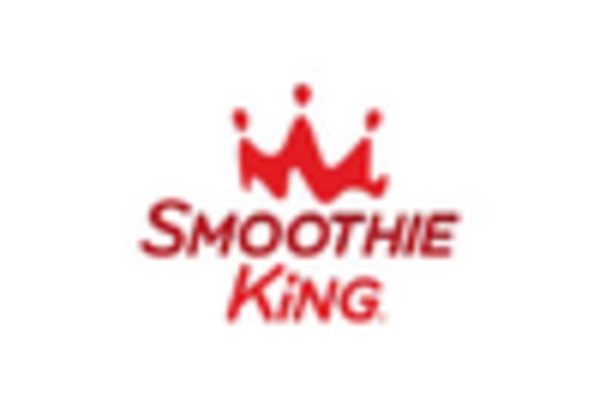
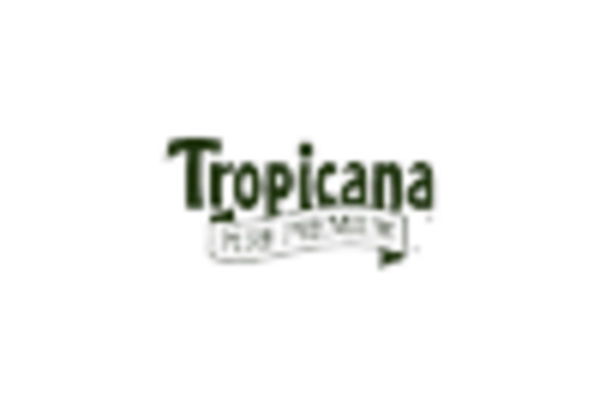









Leave a Comment